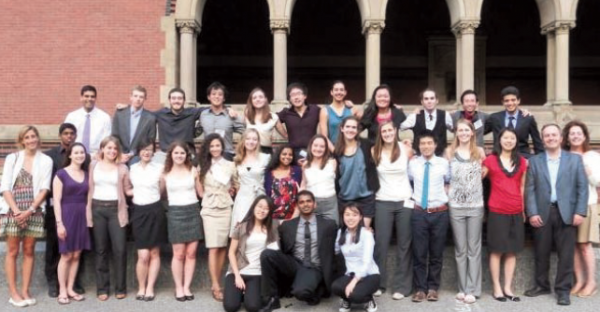 In 2012, for the eighth consecutive year, HSCI hosted undergraduates in a 10-week, lab-based internship program within HSCI labs. This summer’s cohort featured 19 Harvard undergraduates and 24 others from colleges and universities such as King’s College London, Hunter College, Oberlin, College of Wooster, Notre Dame and Texas A & M. As it did in 2011, the HIP program incorporated four HHMI EXROP (Exceptional Research Opportunities Program) interns, providing them with access to the top stem cell research labs in the country.
In 2012, for the eighth consecutive year, HSCI hosted undergraduates in a 10-week, lab-based internship program within HSCI labs. This summer’s cohort featured 19 Harvard undergraduates and 24 others from colleges and universities such as King’s College London, Hunter College, Oberlin, College of Wooster, Notre Dame and Texas A & M. As it did in 2011, the HIP program incorporated four HHMI EXROP (Exceptional Research Opportunities Program) interns, providing them with access to the top stem cell research labs in the country.
As an example of success achieved by our interns, Nada Anzak, from King’s College London, who interned in the Dong Feng Chen Lab at Schepens Eye Research Institute, was awarded a travel grant by Britain’s Royal College of Ophthalmologists in recognition of the work she was performing this summer.
M. William Lensch, PhD, Faculty Director of HIP, developed the curriculum for the companion course/seminar series which is the keystone of this program and provides the interns a unique classroom experience in addition to their lab work. Lensch tapped members of HSCI’s Principal Faculty to deliver seminars in conjunction with the classes and also brought in outside speakers to discuss public policy and industry perspectives.
The internship concluded with a final symposium in which each student delivered both an oral and a poster presentation on their summer’s work. One presenter concluded with the statement that “this was the best summer” of her life.
In reviewing a survey of past years’ interns, approximately 250 in number, Lensch saw evidence of highly encouraging trends. A third of the interns participated as “rising sophomores,” a period critical to decision- making regarding their choice of major. Most critically, the respondents unanimously reported that the HIP experience positively influenced their plan to pursue an advanced degree and, for three quarters of them, to remain in the sciences. Impressively, 22 percent of the respondents received research paper co-authorship as a result of their HIP experience, approximately two-thirds of whom were non-Harvard students.
The survey shows the tremendous value of the HIP experience for both Harvard and non-Harvard students alike. In a White House report on identifying elements crucial for successful STEM (Science, Technology, Engineering and Mathematics) programs, HIP hit on 14 out of 17 elements for “intellectually and personally engaging students.” As we continue to evaluate our program and curriculum, HSCI remains committed to support and train the next generation of stem cell researchers and to help create a scientifically literate public.
